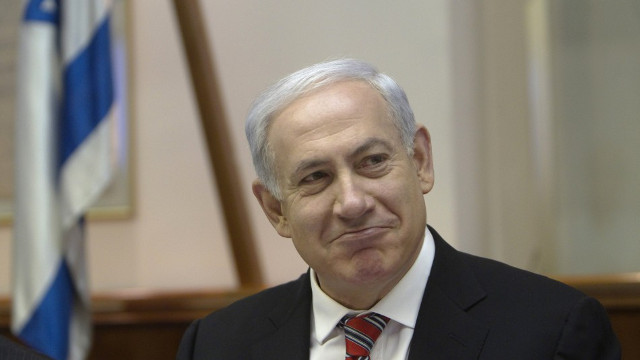SUMMARY
This is AI generated summarization, which may have errors. For context, always refer to the full article.

WASHINGTON, USA – Israeli Prime Minister Benjamin Netanyahu arrived at the White House on Monday, September 30, after warning the United States should not be duped by Iranian ‘sweet talk’ and charm.
Netanyahu was expected to tell President Barack Obama that a diplomatic solution to Tehran’s standoff with the West must include the dismantling of its nuclear program — a more demanding position than Washington’s own.
His limousine pulled up at the West Wing of the White House, as chants of “try Bibi for war crimes” rang out from protesters across the street who used the Israeli leader’s nickname.
The Oval Office talks with Obama threatened to open new tensions in an often testy relationship, which both sides tried to put on a more friendly footing when the US leader visited the Jewish state earlier this year.
Netanyahu arrives as the US capital digests the impact of a startling diplomatic opening which has followed the election of President Hassan Rouhani, and a historic phone call between Obama and the Iranian leader on Friday.
Obama said the conversation had convinced him there was genuine hope of a “resolution” of Iran’s dispute with the West over its nuclear program but would require “meaningful and “transparent” action by Tehran.
But Netanyahu has greeted Rouhani’s conciliatory tone with deep skepticism and warned that it shields a desire to press ahead quickly with a nuclear weapons program
Israel’s Channel One network reported that Netanyahu would tell Obama that Israel would abandon diplomacy if Iran’s nuclear program is not completely dismantled.
That position appeared to run counter to Obama’s statement on Friday that Iran had the right to a “peaceful nuclear energy” program if it lives up to international obligations.
Obama has also said that Iran must not develop a nuclear weapon — a stance that falls short of Israeli red lines for Tehran to halt uranium enrichment, to ship enriched uranium abroad and to close nuclear plants.
Israel has warned it may be forced to take unilateral military action if diplomacy fails to ease what it sees as a existential threat from Iran’s nuclear program.
Obama has also said he could use force as a last resort, but has been more keen to test Iran’s willingness to solve the dispute short of war, and has imposed harsh sanctions which have hammered Tehran’s economy.
Senior US officials said they understood Israel’s concerns, apparently testing a line designed to paper over divisions between the US and Israeli approaches, ahead of the next talks between Tehran and world powers in Geneva next month.
“The Israeli government has every right to be skeptical of the Iranian government, given the statements that have come out of Iran in the past — extraordinarily inflammatory statements about Israel, threats towards Israel’s existence,” said Ben Rhodes, a US deputy national security advisor.
Netanyahu’s skepticism about Rouhani’s motives is being followed and adopted by some of Obama’s hawkish critics in Congress, who could complicate any eventual effort by the president to ease sanctions on Iran should a deal be reached.
Before leaving Israel, Netanyahu said he would seek to expose the true nature of Rouhani, who he has described as a “wolf in sheep’s clothing.”
“I intend to tell the truth in the face of the sweet talk and charm offensive of Iran,” Netanyahu was quoted as saying by Israeli public radio.
“Telling the truth at this time is essential for world peace and security and, of course, for Israel’s security,” he said.
While Iran is likely to dominate the talks, Obama also wants to discuss the US-brokered effort to discuss final status issues between Israel and the Palestinians.
Israeli Justice Minister, Tzipi Livni, who heads the Israeli team in talks with the Palestinians, said in Washington on Saturday that the words “Israel and peace” were not a contradiction.
“The only way to keep Israeli values as a democratic state is by adopting the idea of two states for two people,” she told a conference held by J Street, a pro-Israel lobbying group.
The talks were relaunched in late July after US Secretary of State John Kerry spent months shuttling back and forth to bring the two sides back to the table.
But few details have leaked after seven rounds of discussions, owing to Kerry’s call for a strict news blackout to avoid poisoning the atmosphere.
Palestinian president Mahmud Abbas warned the United Nations last week that the talks offered the “last chance” for peace.
Netanyahu is expected to make his own address to the UN General Assembly on Tuesday.
US officials also say that the Oval Office talks will also discuss Syria, and the effort by the United States and Russia to dismantle the Assad regime’s chemical weapons arsenal. – Rappler.com
Add a comment
How does this make you feel?
There are no comments yet. Add your comment to start the conversation.